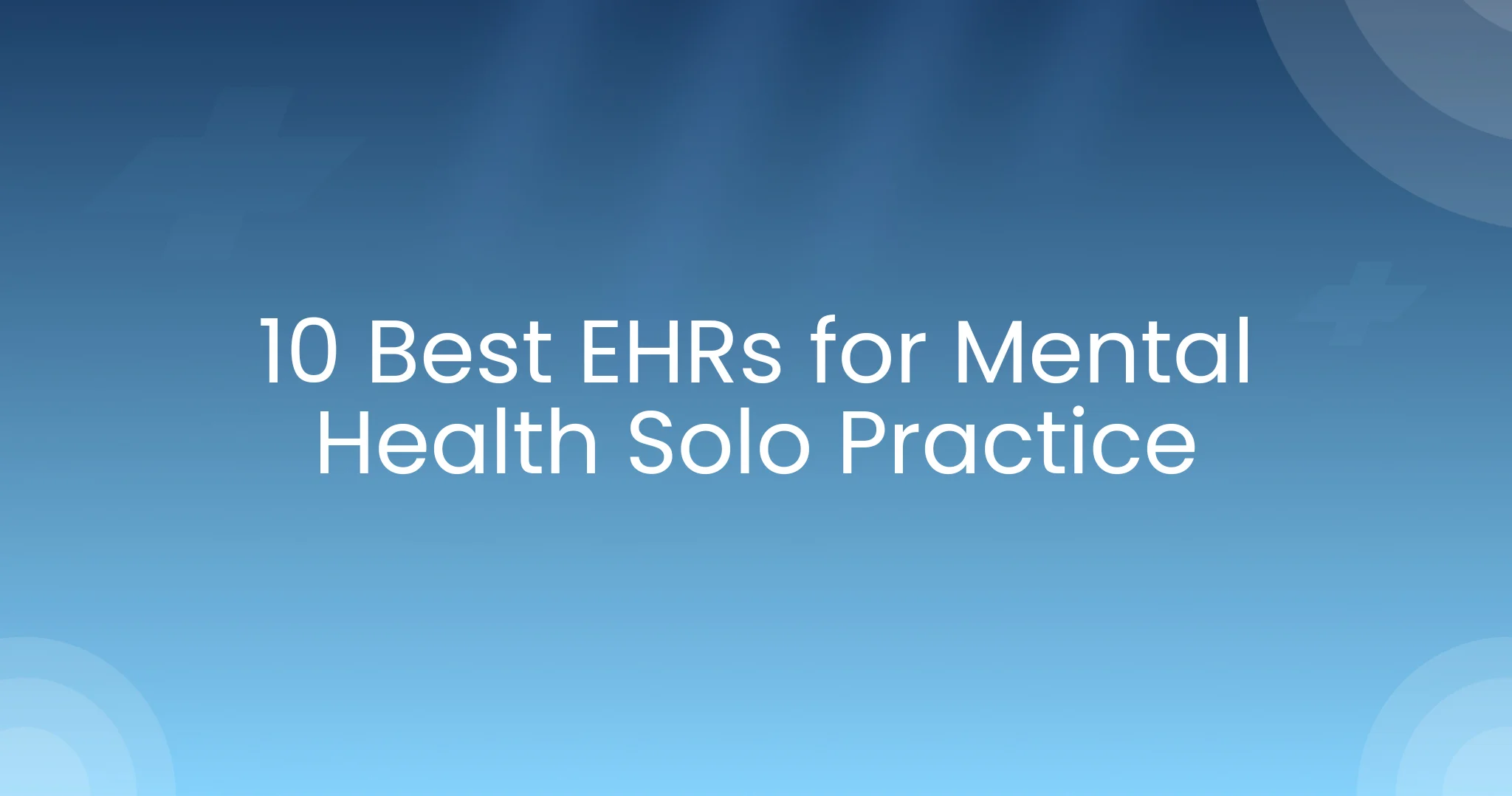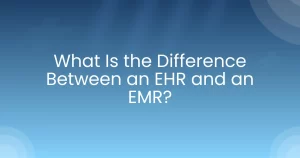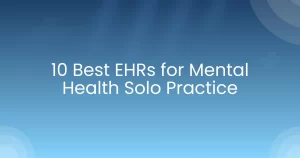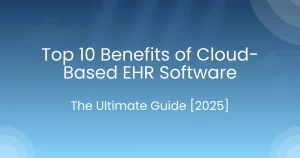Managing a solo mental health practice often brings many other responsibilities, including keeping the business and administrative side of the practice organized. As a solo practitioner, you must juggle patient care with paperwork, scheduling, billing, and office keeping. This is why considering the right Electronic Health Record (EHR) system can transform your daily operations. The appropriate software program can automate and streamline these repetitive administrative tasks.
A 2019 study published in the Journal of the American Medical Informatics Association found that clinicians and solo practitioners using a well-integrated EHR system reported a 30% reduction in time spent on administrative work. With extra time, you can concentrate on providing your patients with the best mental health care treatments. Moreover, a reliable EHR system must be designed with HIPAA compliance and integrated with encrypted data and messaging platforms to keep records and sensitive data safe from unwarranted access. A sound EHR system can centralize client notes, treatment strategies, and billing history, enhancing efficiency and improving the quality and consistency of care provided.
This guide will examine some of the best EHR software for solo practitioners. We’ll also review their best features and how to find the right software for your practice.
Top 10 EHRs for Mental Health Solo Practice
Choosing the right one can be insurmountable given the array of differently branded EHRs. Hence, we have prepared a list of the 10 EHRs for solo practitioners, rating each based on efficiency, compliance, and patient care.
The list of the best EHR systems for small practices includes well-known names and several excellent new options.
1. Pace+
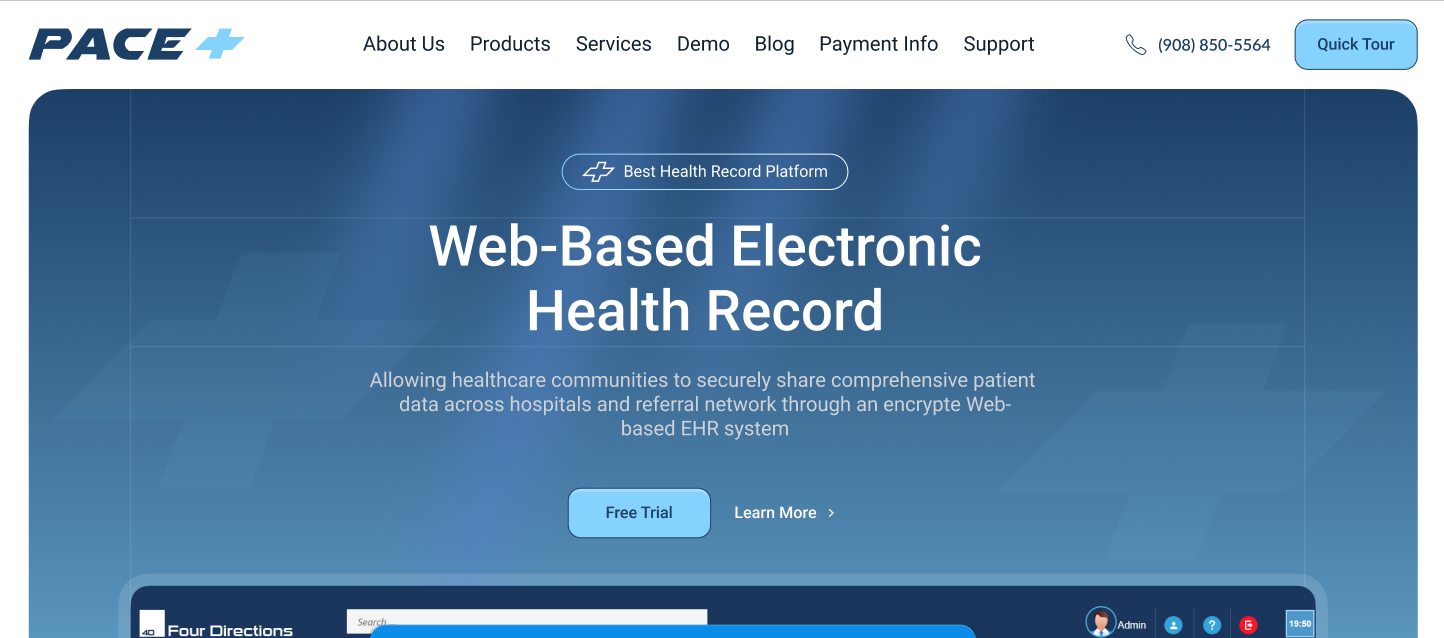
Mental health professionals can use Pace+, an all-in-one EHR. It gives solo doctors everything they need to run their practice from one easy-to-use platform. Pace+ is one of the best EHR software options because it strikes the right balance between cost, ease of use, and features that are useful for solo mental health practices.
Pace+ is a great choice for mental health care professionals who want a full EHR that meets their specific needs. Its powerful set of tools makes keeping records, billing, and getting patients involved easier, all while being affordable and easy to use.
Features
Some of the core features of the Pace+ are mentioned below:
- Tools for planning treatment and writing detailed clinical notes
- System for managing claims and billing built in
- Portal for patients to talk to each other to get more involved
- Automated reminders and scheduling for appointments
- Secure cloud storage that meets HIPAA standards
Pros
Below are some advantages/pros of Pace+
- Tools made just for mental health workflows
- An interface that is easy to use and cuts down on onboarding time
- Affordable, which makes it great for solo practitioners
- The all-in-one platform does away with the need for extra software.
Cons
Some of the disadvantages/cons of Pace+ are listed below
- Some connections to third-party apps are limited.
- Sometimes it takes time to learn how to use advanced features.
- Not as many ways to customize as large-scale EHRs
Best For
Pace+ is best for behavioral health, medical facilities, human service, and Solo mental health professionals are looking for a complete, affordable solution that is made just for how their practice works, keeps records, and follows the rules.
2. SimplePractice
SimplePractice is immensely popular among solo clinicians because it is easy to use and navigate. It offers intuitive scheduling, robust telehealth capabilities, streamlined billing, and client portals that simplify day-to-day workflows.
Features
Some of the features of SimplePractice as listed below:
- Enjoy secure telehealth sessions that come in high definition, ensuring a precise and professional experience.
- Enjoy safe telehealth sessions that are in high definition, so you can be sure of a professional and accurate experience.
- Use the easy-to-use interface that was made for quick and easy navigation.
- Take advantage of easy billing options that work for both self-pay clients and insurance claims.
- Access client portals for intake forms, messaging, and document sharing, which makes it easy to talk to each other.
- Use the built-in calendar with automatic reminders to stay on top of your appointments.
Pros
Here are some Pros of SimplePractice:
- The platform is very easy to use, so it’s simple for new users to get started.
- Users keep saying good things about the customer service, which shows how good it is.
- Comprehensive telehealth and scheduling features cut down on a lot of administrative work, which lets practitioners spend more time caring for patients.
Cons
Below, we have listed some cons of SimplePractice:
- Only higher-tier plans offer some of the more advanced features.
- There might not be as many ways to customize things as there are with other competitors.
Best For
Solo practitioners and small group practices looking for a simple, all-in-one EHR solution that puts efficiency, compliance, and patient engagement first.
3. TherapyNotes
TherapyNotes has an excellent reputation for its strong documentation tools. These include efficient progress notes, customizable treatment plans, and templates built specifically for mental health care.
Features
Here are some of the core features of TherapyNotes
- Built-in prompts make it easier to enter progress notes.
- Treatment plan templates that can be changed to fit mental health care
- Calendar and scheduling tools that send out automatic reminders for appointments
- Billing and insurance claim management that works together
- A safe client portal for sharing documents and talking to each other
Pros
Here are some of the pros listed:
- Best-in-class documentation tools save doctors time and make sure the information is correct.
- Workflows and templates that are specific to mental health
- Customer service that is dependable and quick to respond
- Updates and improvements based on user feedback happen often.
Cons
- People who are new to EHR systems might find the user interface hard to understand.
- Not as flexible for specialties other than mental health
- You might have to pay extra for integrated telehealth features.
Best For
Clinicians and group practices put a lot of importance on clinical documentation and therapy-specific features, especially those who regularly write detailed progress notes and treatment plans.
4. CentralReach
CentralReach is an ideal choice for behavioral health and ABA therapy providers. It includes advanced reporting, customizable templates, and useful built-in telehealth features.
Features
- Advanced reporting and analytics for tracking outcomes and productivity
- Customizable templates to support a wide range of therapy workflows
- Built-in telehealth capabilities for remote client sessions
- Scheduling, billing, and payroll management integrated into one platform
- Comprehensive client and case management tools
Pros
Here are some of the pros listed:
- Especially suited for ABA and behavioral health practices
- Highly customizable templates and documentation forms
- Strong built-in reporting and data analysis
- Seamless telehealth integration supports virtual therapy
Cons
- May be more complex than necessary for general solo practice needs
- Pricing is typically higher compared to basic EHR solutions
- Learning curve for new users with limited tech experience
Best For
Behavioral health professionals and ABA therapy providers looking for a specialized, feature-rich platform to manage advanced reporting, clinical documentation, and virtual care.
5. Headway
Headway stands out with its strong focus on simplified billing and insurance claims. It helps practitioners efficiently manage reimbursements while minimizing administrative headaches.
Features
- Simplified billing and claims processing for insurance
- Scheduling and reminders for appointments all in one place
- Dashboard for tracking revenue that is easy to use
- Tools for safe client communication
- Automated management of reimbursements
Pros
Here are some of the pros listed:
- A lot less time is spent on paperwork for billing and insurance.
- Quick and correct insurance claims that help cash flow
- Simple setup and an interface that makes sense for solo clinicians
- Prices that are clear and no long-term contracts
Cons
- Not as many clinical documentation features as other EHRs
- Not as much freedom to change note templates and treatment plans
- At the moment, it’s only available in some states and through some insurance networks.
Best For
Solo mental health providers are looking for a simple, billing-focused solution that cuts down on administrative work and makes it easier to work with insurance so they can get paid quickly.
6. Kareo Clinical
Kareo Clinical is a cloud-based electronic health record (EHR) for small private practices that combines billing, scheduling, and charting into one easy-to-use platform.
Features
- A single dashboard for making charts, setting appointments, and billing for medical services
- Access the cloud safely from any device
- Tools for e-prescribing and managing medications
- Templates for clinical documentation that can be changed
- Patient portal for safe messaging and managing appointments
- Analytics that work together to give you information about billing and performance
Pros
Here are some of the pros listed:
- The all-in-one platform makes managing a practice easier.
- Simple to set up with an interface that is easy to use
- Cloud-based access gives solo and remote workers more options.
- Helpful onboarding help and support resources
Cons
- Not many advanced features for bigger or very specialized practices
- Sometimes, customer support takes longer to respond than usual.
- Some users say that some updates have small problems.
Best For
Solo and small practice providers who want a dependable, cloud-based EHR that combines billing, scheduling, and charting to make it easier to manage their clinical and administrative tasks.
7. DrChrono
DrChrono offers mobile-friendly access, customizable forms, e-prescribing, and telehealth support. It is a highly flexible option for solo practitioners who are always on the go.
Features
- A full-featured mobile app for iOS devices that lets you chart and manage from anywhere
- Templates that you can change to fit your needs for workflows
- E-prescribing that works with controlled substances (EPCS)
- Use safe telehealth tools for sessions from a distance
- Setting up appointments and reminding patients of them
- Tools for checking eligibility in real time and billing automatically
Pros
Here are some of the pros listed:
- Very easy to move around and flexible for traveling or remote doctors
- Forms and documents can be highly customized.
- Built-in telehealth and e-prescribing features that are easy to use
- Regular updates and improvements to help solo practitioners
Cons
- iOS has the best support for all features, while Android has less support.
- Some advanced features are harder to learn.
- Sometimes extra costs for premium modules
Best For
Solo practitioners or small practices that need an EHR that is flexible and mobile-first so they can see patients, manage charts, and do administrative work from almost anywhere. Solo and small practice providers who want a reliable, cloud-based EHR that combines billing, scheduling, and charting to make it easier to manage their clinical and administrative tasks.
8. Luminello
Built with psychiatrists in mind, Luminello provides simple charting, e-prescribing, strong HIPAA compliance, and a patient portal designed specifically for mental health needs.
Features
- Easy-to-use charts made for keeping track of mental health information
- E-prescribing makes it easy to manage your medications.
- Patient portal for intake, communication, and safe document sharing
- Strong HIPAA compliance measures, like secure messaging and encrypting data
- Scheduling and appointment reminders that work together
Pros
Here are some of the pros listed:
- The interface is clean and simple, making it perfect for solo or small practices.
- Quickly taking notes and making patient charts easier
- Makes it easier to manage and renew prescriptions
- Strong security features to keep private patient information safe
- A patient portal made just for people with mental health issues
Cons
- Compared to more complete EHRs, billing integration is limited.
- Not as many ways to change templates and forms
- Advanced reporting features might not be as strong as those on bigger platforms.
Best For
Solo psychiatrists and mental health professionals who want an easy-to-use, HIPAA-compliant EHR with great charting, e-prescribing, and a patient portal that focuses on mental health.
9. Jane App
Jane App is a highly versatile tool, primarily for solo clinicians, offering practice management, appointment booking, telehealth, and flexible documentation features.
Features
- Setting up appointments and managing calendars online
- Telehealth that works with other systems for virtual sessions
- Charting that can be changed and documentation that is flexible
- Online intake forms and reminders that happen automatically
- Easy billing, invoicing, and processing of payments
- A client portal for scheduling and talking to people on your own
Pros
Here are some of the pros listed:
- Easy-to-use interface perfect for solo providers
- Makes it easier to book appointments and manage clients
- Documentation tools that can be changed and are flexible
- Included reliable telehealth features
- Clear prices and helpful customer service
Cons
- Not many advanced features for larger or multi-provider practices
- Not as many templates for specific specialties as some competitors
- Doesn’t come with built-in tools for managing insurance claims
Best For
Solo clinicians and small practices that want a simple, easy-to-use platform that includes practice management, scheduling, telehealth, and charting without adding extra steps.
10. TheraNest
TheraNest is an affordable EHR for small practices that supports solo practices with progress notes, treatment plans, integrated billing tools, and engaging client features.
Features
- Plans for small and solo practices that are affordable
- Templates for progress notes and treatment plans that are safe and easy to use
- Tools for managing billing, invoicing, and claims all in one place
- A client portal that is easy to use and lets you share documents and get reminders for appointments
- Telehealth features
- You can make your own reports to get practice insights.
Pros
Here are some of the pros listed:
- Affordable for small teams and solo clinicians
- Makes it easier to write clinical notes and bill patients
- Reminders and easy access to information make clients more involved.
- Customer service that is reliable and helpful, onboarding materials
Cons
- May not have some advanced features that larger group practices want
- Not much room for customization for complicated workflows
- Some users say that the interface looks old compared to newer platforms.
Best For
Solo practitioners and small mental health practices that want an affordable, all-in-one EHR solution that makes it easier to keep records, bill clients, and talk to clients without any extra features they don’t need.
Why Choosing the Right EHR Matters for Solo Clinicians
Choosing the right EHR for small practices makes it easier and more efficient for you to handle different tasks. A good system can completely change your daily work, letting you focus on what’s most important.
- Ultimate Time-Saver: Lets you spend less time on paperwork and more time taking care of clients.
- Streamlined Administration: This platform combines billing, scheduling, documentation, and communication.
- Accurate billing and claims lower mistakes, speed up payments, and ensure that insurance claims are handled smoothly.
- Automated Scheduling: Appointment reminders and the ability to book online cut down on missed sessions and no-shows.
- HIPAA Compliance & Security: Protects patient privacy with data security and HIPAA-certified safeguards that are standard in the industry.
- Client Engagement: Patient portals, secure messaging, and automated reminders all make it easier for clients to talk to each other.
One of the most important things you can do to ensure the long-term success of your mental health solo practice is to choose the right EHR. A good system simplifies daily tasks, ensures rule compliance, increases client involvement, and improves clinical outcomes. Pace+ can help solo practitioners streamline their work, save time, and put more energy into providing high-quality mental health care.
What Key Features to Look For in any EHR?
The key features to look for when choosing an EHR system must boost your practice’s efficiency. All of the features should help make the lives of your employees and the patients you serve easier. The best EHR for a small private practice is one that makes the workflow run smoothly and is easy to use, not one that just stores records. Systems for mental health professionals are beneficial when considering your options.
Simple to Use and User-Friendly Interface
Which EHR system is the easiest to use? You don’t have to spend as much time learning software if the platform has a simple layout and a streamlined workflow.
Specialized Templates for Mental Health
SOAP notes, DAP notes, customizable treatment plans, and built-in tests like PHQ-9 help clinicians write down information faster and more accurately.
Integration of telehealth
You can offer flexible care while meeting professional standards using secure video conferencing, built-in telehealth options, and mobile access.
Insurance Claims and Billing
Automated billing, claim submission, and payment tracking reduce financial errors and ensure timely payment to your practice.
Compliance with HIPAA and Security
Strong HIPAA compliance and data security measures keep sensitive patient information safe and help build client trust.
Tools for CRM and client engagement
Is there a CRM in SimplePractice? Many platforms now have client portals, secure messaging, and automated reminders that make it much easier to talk to clients.
Access and portability on the go
Cloud-based systems and mobile apps let you run your practice from anywhere. The system enables people to work alone in a clinic, giving them much freedom.
How to Choose the Right EHR
Choosing the right EHR systems for small practices guarantees smooth workflows and long-term viability. You should closely examine features that save them time, decrease paperwork substantially, and assist with compliance easily. The best EHR for solo practice would include intuitive scheduling, safe telehealth, consistent billing, and easily configurable templates.
The best choice ensures patient confidentiality, enhances efficiency, and improves the customer experience. The best EHR for a small practice meets your goals through a well-thought-out evaluation of workflow needs, usability, and patient satisfaction. Ensure that time is allocated to review your options now, saving you from incurring costly mistakes later.
- Identify Your Workflow Need: Every practice is different. Select an EHR for solo practice that best understands which tools will help facilitate its daily tasks and general workflow.
- Take Their Free Trials: You would get firsthand ideas about their functions in real-life situations. This should help them distinguish the best EHR for the solo practice based on their needs.
- Test Two or Three Options: Limit your selection to two or three solutions. EHR systems for small practices are easier to compare when you have a limited, focused selection.
- Use Their Free Trials. Free trials let you explore features in a real-world setting. Use them to help you determine the best EHR for solo practice for your unique needs.
- Evaluate Your Options After 30 Days. After a month, put all systems under review with the overall performance, efficiency, and credibility in mind. A brief test is truly illuminating for long-term adoption.
- Consider Ease of Use and ROI. A user-friendly platform enhances efficiency almost instantly. Give priority to those solutions that have successfully attained that fine balance, one with a healthy return on your investment.
- Get Patient Feedback: Clients are excellent usability testers. Their feedback can assist you in ascertaining if you have settled on the best EHR systems for small practices.
The best EHR for a mental health solo practice will be a system that supports compliance, enhances your workflows, and delivers consistent value for patients and providers.
Conclusion & Next Steps
The right EHR for small practices could be a game-changer for solo practitioners in mental health care services. With Pace Plus, you have an ideal solution that optimizes your workflow and streamlines daily administrative activities. An all-in-one EHR and a complete practice management solution are highly impactful in transforming the day-to-day work and life integrations.
Pace+ has a highly user-friendly interface and clinical templates built exclusively for mental health professionals. It covers client scheduling, clinical documentation, integrated billing, and secure client portals. It’s completely HIPAA compliant, ensuring that data security and patient privacy always secured. With all these key features, Pace+ allows you to focus more on your clients and less on burdensome administrative tasks.
What part of your practice do you find most challenging to manage right now?
FAQs
What is the best EHR for private practice?
Pace+ is an affordable EHR with an easy scheduling and billing interface for small practices. Conversely, the Jane App is a good alternative, offering simple tools for solo practices that need variable solutions with mobile-friendly capabilities.
What is the easiest EHR system to use?
Pace+ is also an affordable EHR for small practices with a simple user interface for scheduling and billing. On the other hand, the Jane App offers easy-to-use tools for solo practices requiring flexible, mobile-friendly solutions.
What is an EHR for behavioral health?
An EHR for behavioral health is a comprehensive system designed specifically to digitize the unique needs of mental health providers. For example, a complete documentation system that includes progress notes, treatment plans, and assessments is included. The system is also fully compliant with HIPAA. These features help clinicians care for patients and manage records through one centralized system.
